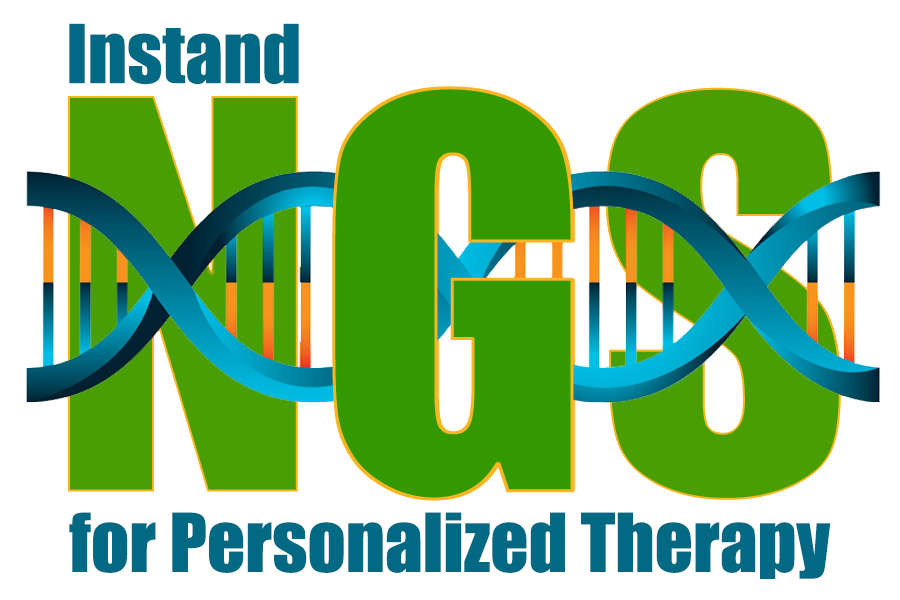Advisory Boards
Instand-NGS4P Ethics Advisory Board
The Instand-NGS4P project will be conducted under the supervision of the Ethics Advisory Board which is composed of 4 external (international) experts recognized for their expertise in the various fields of the project, in order to:
- Advise on responding to emerging developments
- Provide advice on ethics concerning political, commercial and economic interests;
- Advise on the main ethical practices to be followed on the project and in the PCP specific activities (WP6 and WP8);
- Advise the GB on potential ethical problems and on appropriate ethical procedures, especially regarding sensitive patients as in paediatrics and rare cancers;
- Contribute toward establishing and maintaining partners’ awareness on relevant ethical issues Workflows;
- Advise on the main security practices to be followed on the project.
- Provide a report at the end of the 2 reporting phases, enclosed with the EC reporting.
Ethics Advisory Board Members:
|
Nikolaus Forgó Professor of IT and IP Law Department of Innovation and Digitalisation (Austria) |
|
|
Roberto de Miro d´Ajeta Italian Federation of Volunteer-based Cancer Organizations – FAVO (Italy) |
|
|
Barbara Prainsack Professor for Comparative Policy Analysis University of Vienna (Austria) |
|
|
Emmanuelle Rial-Sebbag Professor in Health Law Inserm (France) |
Ethics Advisory Board Members Biographies:
Nikolaus Forgó CV
|
Professor of IT and IP Law |
Curriculum Vitae (Extract)
Born 1968 in Vienna
Law Studies in Vienna and Paris
1990 - 2000 University Assistant at the Faculty of Law of the University of Vienna and its IT representative
1998 Founder and ever since head of the Postgraduate Program for Information- and Media Law at the University of Vienna
2000 - 2017 Professor for IT-Law and Legal Informatics at Leibniz University Hannover
2007 - 2017 Head of the Institute for Legal Informatics at Leibniz University Hannover
2013 - 2017 Director of the Research Center L3s
2013 - 2017 Data Protection Officer of Leibniz University Hannover
2015 - 2017 Chief Information Officer of Leibniz University Hannover
Since March 2017 Member of the Digitalisation Council of Lower Saxony
Since October 2017 Professor for IT- and IP Law at the University of Vienna, Department of Innovation and Digitalisation in Law
Since July 2018 Expert member of the Data Protection Council of the Republic of Austria
Extensive dogmatic and third-party funded research for European, German and Austrian clients regarding questions of IT law, in particular data protection and data security law. Evaluation and consulting activities i.a. for the European Commission, the German Research Foundation, the German Ethics Council as well as various German and Austrian ministries.
List of presentations (in extracts, since 2018)
Courses in the summer semester 2020
030040 KU Legal Research
030250 SE Seminar: current Questions of it-law for diploma students
030438 KU Hackathon "Legal Tech" - in cooperation with FH Campus Wien (DI Heimo Hirner)
030597 KU The European Data Protection Framework: Recent Developments
051019 VO IT and Law
380023 SE Seminar for graduate students: Current IT-Law Problems
Roberto de Miro d´Ajeta CV
|
Italian Federation of Volunteer-based Cancer Organizations – FAVO Italy |
Roberto was born in Rome, Italy on 8th February 1964. After graduating from high school in humanities, between 1989-1994, Roberto visited Santiago de Compostela and completed a 100 miles walk, graduated magna cum laude in Law, specialized in Roman and Comparative Law, followed by the admission to the Bar and in 2006 at the High Courts. Roberto also been appointed teacher of Law and Economics in State High School.
As a Lawyer, but also as a long-term experienced carer to a family member who is a cancer patient, Roberto had the opportunity to concentrate on the psychosocial needs of cancer and other disability patients, to revenue existing laws on the matter (especially labor/bank and insurance law) and even to participate to the drafting of law reforms and Charts.
His commitment in advocacy for cancer patients is to demonstrate that the best interest of the patients and their carers reside in cooperation among the stakeholders: industry/public welfare/families/ health professionals/banks and insurers/employers. Law reforms are needed and critical to the issue, but Roberto also deems necessary to avoid any old-fashioned attitude of not necessary opposition – but for the cases in which a violated right needs to be reaffirmed.
Barbara Prainsack CV
|
Professor for Comparative Policy Analysis Head of Department (managing) Member of the ethics committee in the fields of Social and Economic Sciences of the University of Vienna Neues Institutsgebäude |
Research interests
Health policy; practices, institutions and politics of solidarity; political, social and ethical aspects of Personalised Medicine; data-rich practices in science and medicine; regulation of DNA technologies in medicine and forensics; comparative science & technology policy
Short biography
• Study of Political Science at the University of Vienna
• 2002: Visiting Doctoral Student at the Department of Behavioral Sciences, University of California, San Francisco
• 2004: Doctoral Thesis on “’Negotiating Life’: The Regulation of Embryonic Stem Cells Research and Human Cloning in Israel“ (Dissertation Award of the Austrian Political Science Association)
• 2005-2007: Postdoctoral Student at the Department of Political Science, University of Vienna
• October 2005: Visiting Professor at the Institute of International Studies, Ramkamhaeng University, Bangkok
• Fall 2006: Guest Scientist at ESRC Centre for Economic and Social Aspects of Genomics, Cardiff University, Wales
• 2007: Senior Lecturer, then Associate Professor at the Center for Biomedicine & Society, King’s College London
• Summer semester 2010: Guest Lecturer at the Faculty of Social Sciences, Goethe University, Frankfurt
• September 2011 – Dezember 2012: Professor for Sociology and Politics of Life Sciences, Brunel University, London
• 2013-2017: Professor at the Department of Global Health & Social Medicine, King’s College London
National Ethics Councils, governmental and other advisory roles, scientific advisory board memberships
• Since 2009: Member of the Austrian Bioethics Commission
• 2009-2014: Representative of the United Kingdom in the Committee for Social Sciences, European Cooperation in Science & Technology (COST)
• Since 2011: Member of the British Royal Society of Arts
• 2011-2012: together with Aarno Palotie and Stephen Holgate: Leader of the „Forward Look“ on Personalised Medicine, European Science Foundation (ESF)
• 2015-2017: Member of the Ethics Commission of the UK National DNA Database (NDNAD), Home Office, UK
• 2016: Bellagio Fellow, Rockefeller Foundation
• Since 2017: Member, European Group on Ethics in Science and New Technologies (advising the European Commission)
• Since 2017: Elected Foreign Member, Danish Royal Academy of Sciences and Letters
Selected Bibliography
A full list of publications is available here: https://www.researchgate.net/profile/Barbara_Prainsack
Journal Articles
Find all articles here.
Books (selection)
Barbara Prainsack. 2017. Personalized Medicine: Empowered Patients in the 21st Century. New York City: New York University Press.
Reviews:
Personalized Medicine Is the Postgenomic Condition, by Carolyn O. Neuhaus, Hastings Center Report, 26.05.2018, Volume 48, Issue 3
Putting The Person in Personalized Medicine, by Consuelo H. Wilkins, Health Affairs, VOL. 37, NO. 5
Boxed Warning, by Laura Hercher, Genome, 03.04.2018
Personalized Medicine: Empowered Patients in the 21st Century?, by Nadine Levin, Medical Anthropology Quarterly - International Journal for the Analysis of Health, 16.08.2018
Personalized Medicine: Empowered Patients in the 21st Century, by Lauren Diamond-Brown, Social Forces, soz045, 14.05.2019
B Prainsack. Personalized Medicine: Empowered Patients in the 21st Century?, by Andrew Bartlett, Sociology of Health & Illness, 17.05.2019
Personalized Medicine: Empowered Patients in the 21st Century?, by Linda M. Blum, K. J. Surkan, Contemporary Sociology: A Journal of Reviews, 15.05.2019
Personalized Medicine: Empowered Patients in the 21st Century?, by Jeremy Freese, American Journal of Sociology Volume 125 Number 1 (1.07.2019)
Barbara Prainsack, Alena Buyx. 2017. Solidarity in Biomedicine and Beyond. Cambridge, UK: Cambridge University Press.
Reviews:
Barbara Prainsack, Alena Buys (2017) Solidarity in Biomedicine and Beyond (Cambridge Bioethics and Law), by Markus Zimmermann, Ethik Med (2020) 32:117–119, 23.01.2020
Solidarity in biomedicine and beyond, by Katherine Weatherford Darling, New Genetics and Society, 15.03.2018
Barbara Prainsack and Aleny Buyx, Solidarity in Biomedicine and Beyond, by Mark Flear, Medical Law Review, 03.03.2018
Book Review: Solidarity in Biomedicine and Beyond, by Edward S. Dove,
SCRIPTed, VOL. 14, Issue 2, 12/2017
Scott Frickel, Mathieu Albert, and Barbara Prainsack (eds). 2016. Investigating Interdisciplinary Collaboration: Theory and Practice across Disciplines. New Brunswick, NJ: Rutgers University Press.
Barbara Prainsack and Alena Buyx. 2016. Das Solidaritätsprinzip. Ein Plädoyer für eine Renaissance in Medizin und Bioethik. Frankfurt am Main: Campus.
Helena Machado, and Barbara Prainsack. 2012. Tracing Technologies: Prisoners’ Views in the Era of CSI. Abingdon: Routledge.
Emmanuelle Rial-Sebbag CV
 |
Emmanuelle Rial-Sebbag- Lawyer-, Graduate in health law (Faculty Bordeaux), Ph.D in Health Law (European mention, University Paul Sabatier Toulouse). She is Director of research at Inserm in health law and bioethics. She is the leader of a multidisciplinary team, BIOETHICS - BIOethics Exploring Trajectories of Health Innovations Challenging Society, at the Inserm/Paul Sabatier University 1027 Unit. She is an Associate lecturer in bio-law and bioethics at the University of Medicine in Toulouse (Purpan). She is involved in several research projects at National, European and International level, on the topics of biobanking and personal data, innovative therapies, biomedical research involving human beings and vulnerable individuals (minors), genetic testing and Big Data. She was the coordinator of the EUCelLEX project (FP7 2013-2016, Cell-based regenerative medicine new challenges for EU legislation and governance, GA 601806, https://www.eucellex.eu/). She is leading the UNESCO Chair “Ethics, Science and Society” (https://chairee2s.hypotheses.org/).
